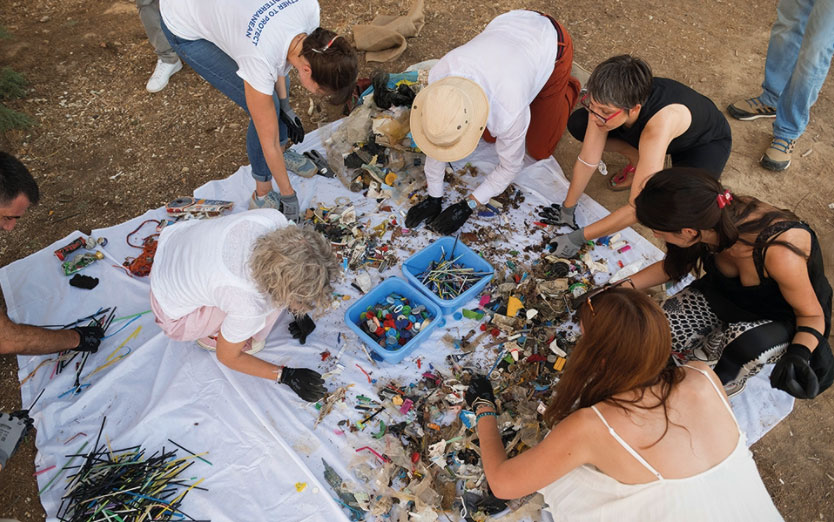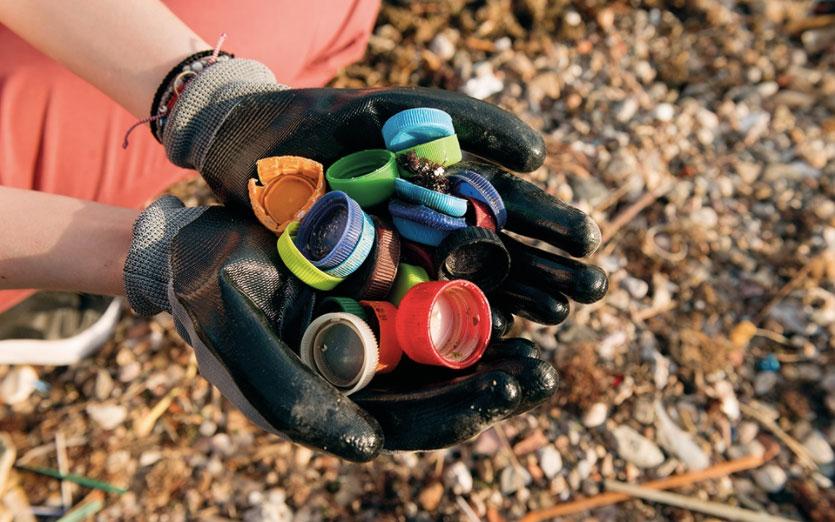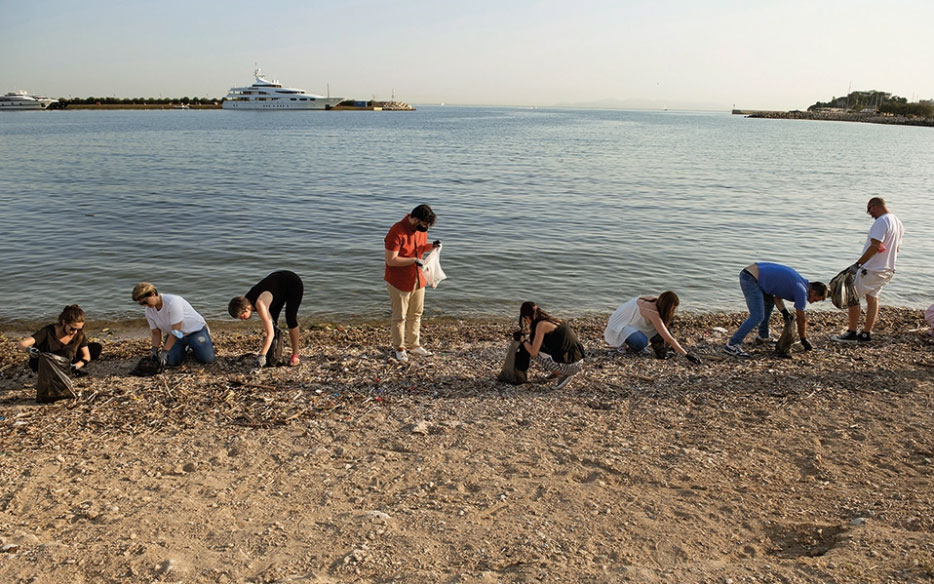It's one thing to write about the plastics in our seas, another altogether to pick them up with your own hands. That's why we adopted a beach as part of WWF Greece’s initiative.
1,074 straws, 366 cotton swabs, 1,095 bottle caps, 93 cigarette butts, and much more; we picked up a total of 5,047 pieces of litter, weighing 57.5 kilos.
It was the result of hard work, in hot weather conditions, by members of the editorial team of Greece Is and the rest of Kathimerini Publications, who collected, categorized, counted, and recorded the litter on the beach behind the Peace and Friendship Stadium, near our offices in Neo Faliro. The activity was part of the “Adopt a Beach” initiative of WWF Hellas.
Launched last May, groups from every corner of Greece already participate in the program, which monitors coastal pollution and collects valuable data. The program is funded by the Green Fund and is based on the relevant United Nations Environment Programme protocols.
Each group “adopts” a beach, essentially cleaning up a 100 meter section of the beach and recording the findings up to four times a year, in predetermined months; December or January (winter recording), April (spring recording), June or July (summer recording), September or October (autumn recording). “Basically, we want to see the seasonal patterns in terms of litter pollution in order to record how the amount and the composition varies according to the season,” explains Konstantinos Tsoukalas, WWF Hellas’ Local Actions manager. He’s the man in charge of welcoming and guiding the groups wishing to participate in the program through informative workshops, as well as answering questions.
Currently, seventy-three groups have already adopted eighty-two beaches all over Greece, and more than fifty clean-ups/counts/recordings have been made. “As expected, more than 80% of the litter that has been found and recorded is plastic,” Tsoukalas reveals.
More specifically, he notes, based on the findings of the “core teams” – teams that conducted clean-ups and recordings before the official launch of the program, so that adjustments and corrective actions could be made according to their experience –”84% were plastic, with cigarette butts being crowned as the champions, but also pieces of plastic sized 2.5-50 centimeters, straws, baby wipes, and caps, while 16% were metal, paper, processed wood, etcetera.”
On average, 925 pieces of litter per 100 meters of coastline were recorded, at a time when the European Union has set a maximum limit of 20 pieces of litter per 100 meters in order to maintain the good environmental status of the coastline.

We found 4,724 pieces of plastic on a 1000 square meter section of the beach.
© Vangelis Zavos
The figures are impressive yet not surprising, considering that every person in Greece produces 68 kilos of plastic waste per year. According to them, the total amount of plastic produced and used in the country is 700,000 tonnes per year, with almost 40,000 tonnes dumped into nature. Waste production increases even more in the summer months, with thousands of plastics ending up in the seas and on the coast.
In the 1,000 square meters of the beach we cleaned up, we collected 4,724 pieces of plastic. “I think what shocked me the most was the huge number of straws we found,” noted Niki Agrafioti. “And the hundreds of plastic lollipop sticks and ear swabs,” added Pagona Lapsati. There was also no shortage of aluminum packaging from soft drinks and alcoholic beverages, tetra pak packaging, plastic bottles of various sizes, lids, cigarette butts, and of course, disposable masks.
“It is estimated that every year more than 11,500 tons of plastic waste end up in our seas as a result of the inadequate waste management system,” says Achilleas Pletharas, footprint manager at WWF Hellas, in a press release.
“Personally, there were two things that struck me: the first is the fact that there is a beach unknown even to those of us who work ten minutes away. We may easily write off and forget about a beach so close to the city on account of pollution, but we don’t just go to the beach to swim; we can come here for a walk, to enjoy the salty breezes and the view of the open horizon, or have a picnic. Secondly, seeing with our own eyes and touching with our own hands all the things you hear and read about – the experience of personal contact with so much plastic, and so much human indifference, helps you to have a whole different perspective on the issue of environmental degradation. Suddenly everything seems much closer to you; you realize it affects you in a much more direct way,” noted “K” Magazine editor-in-chief Dimitris Rigopoulos.

Bottle caps and plastic straws were the most common trash at the beach.
© Vangelis Zavos
I was surprised by the number of plastics we collected, and in such a small area. It seemed as if every square meter was covered with dozens of pieces of plastic and other waste. The negative impact we, as a species, have on the planet is rapidly reaching a tipping point. Seeing how much plastic we picked up just outside our “doorstep” really unveiled the magnitude of the problem and how much more we all need to do to effectively manage the disposal of human-generated trash before it’s too late. We need to act now,” said Duncan Howitt-Marshall.
Separating, counting, and recording the waste on the corresponding form, a central part of the action, proved to be challenging and time-consuming. Findings are registered in each group’s profile on the project’s website and are available to the public. “This is a citizen science program, not just a one-time beach clean-up program. So essentially, all team members become researchers by going to the beach and collecting, counting, and recording the litter,” Tsoukalas explains.
WWF aims to create a comprehensive national platform for recording plastic pollution on Greek beaches, which is extremely important, as data collection is one of the main prerequisites for tackling the problem. The main findings will be reflected in an annual report sent to public services, municipal authorities, and research bodies. Furthermore, this database will be made public and available internationally to all the citizens of the world. “Students, scientific institutions and universities have the opportunity to access the data collected from each beach and use it as they wish”, stresses Tsoukalas, and concludes by noting that “in general, we believe that the practice of citizen science and the application of conventional science is the way to quickly and easily achieve both knowledge and awareness.”
Elis Kiss confirms this in her own words: “The initial image of the beach is hard to get out of the mind. It was a truly shocking scene, which couldn’t have left anyone indifferent. When I got home that night, I had that sense of having achieved something – no matter how small. Everyone poured their souls into it. That day was a good day.”
We set a date in autumn for the next collection/count/recording, determined to make our planet better and cleaner, one (or hundreds) of straw(s) at a time.
This article was previously published in Greek at kathimerini.gr.









